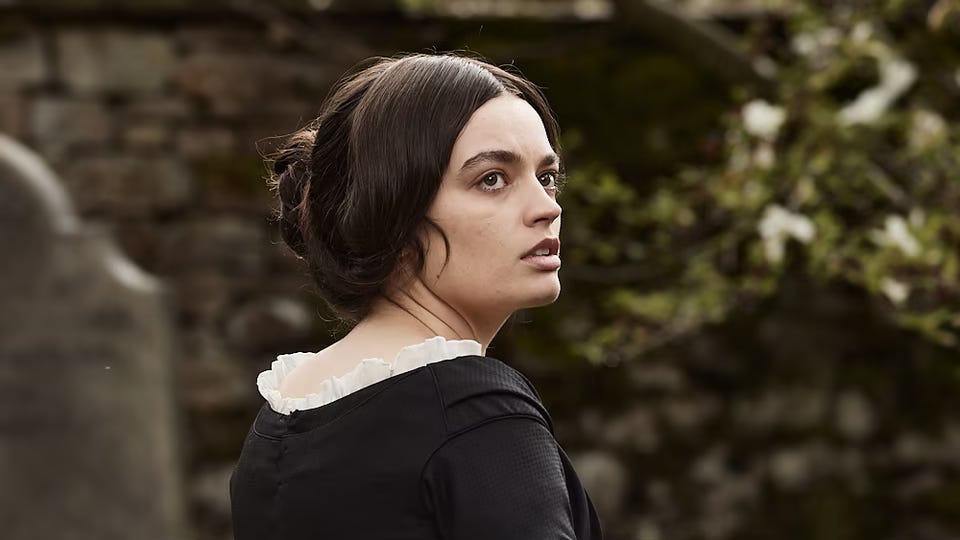Emily
In her directorial debut “Emily,” Frances O’Connor brings to life a partially fictional coming of age story from the beloved classical author Emily Bronte.
First released in 2022 throughout the U.K., “Emily” is a creatively nuanced biopic that takes a slightly gothic approach to the notion that art imitates life. The creative liberties taken by O’connor allow those familiar with Bronte to experience a narrative of her life that is littered with inspirations from Wuthering Heights.
Throughout the film we see Emily Bronte, played by Emma Mackey, navigate a series of challenges and situations that resemble those faced by her fictional creations. This creative decision allows the narrative to clearly express the idea at its core that there is “freedom in thought.”
Not only does this rebellious phrase underlie the film’s central narrative, it is also expressed in the film’s very foundation of taking creative liberties in the creation of a cinematic representation of an author's biography. This bold yet successfully executed decision has resulted in a romanticized portrait of Emily Bronte’s life as a young adult and chronicles her experience and mindset leading up to her writing of Wuthering Heights.
By taking this unconventional approach to making a cinematic biography, O’Connor opens the door for filmmakers to take increasingly more creative risks when tackling the task of crafting biopics that are based equally in truth and the pursuit of an inherently compelling experience for audiences.
Though this choice often tends to abandon accuracy in favor of a more sensationalized retelling, it does leave more narrative space to foster the connection felt between audiences and the authors of the various works that they love.
O’Connor brings this fabled biography of Emily Bronte to life through a skillful combination of expressive cinematography that allows for an ample amount of visual storytelling, and dynamic dialogue that is simultaneously direct yet suggestive in its execution. The decision to favor a more visually expressive story that focuses on accentuating the somber color scheme and capturing the vastness of Bronte’s surroundings, serves to amplify the themes of mental isolation and austerity throughout the film. The benefits to this method of storytelling are most clearly demonstrated in the compelling romance that soon becomes the film’s focal point.
By allowing the passions that fuel a whirlwind romance to be the primary motivation driving the plot, O’connor is able to express the essence of Bronte’s unconventional nature and demonstrate how these subtleties within her personality and expression made their way into her writing.
One of the most notable resemblances between Wuthering Heights and “Emily” is the allusion to mental illness present throughout both narratives. Though expressed indirectly in both, each story presents the female lead as struggling to cope with a mental affliction that impacts and influences their relationships to those around them.
This theme is felt the strongest in “Emily” through the film’s exploration of Bronte’s relationship with her brother Branwell. Though evidently strained by the volatility of her actions and emotions, his bond with his sister is clearly the strongest and most fleshed out of those around her.
Emma Mackey’s performance as Emily is not only compelling and earnest, it also highlights Bronte’s contrary nature that allowed her writing to set her apart from her literary contemporaries. This impression is further supported by the on screen chemistry clearly present between Mackey and fictional love interest William Weightman played by Oliver Jackson-Cohen.
The film’s editing and dynamic cinematography not only sets the tone for how Emily felt in relation to those around her, but it also allows opportunities for the audience to experience Bronte from their perspective. Not only do these aspects of “Emily” help further immerse the viewer in a somewhat fictional and romanticized story about a non-fictional character, they also foster cohesion between these opposing concepts.
Despite the controversial historical inaccuracies present throughout the film, “Emily” succeeds at its core intent; to build or strengthen the connection felt between Bronte and her audience.
In light of the current craving of audiences for dramatic, emotionally engaging, and cinematic period pieces with bits of modernity sprinkled in, “Emily” is set to exceed the expectations for fans of the genre.



